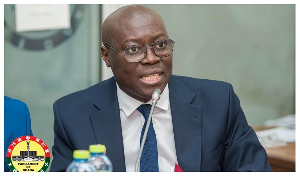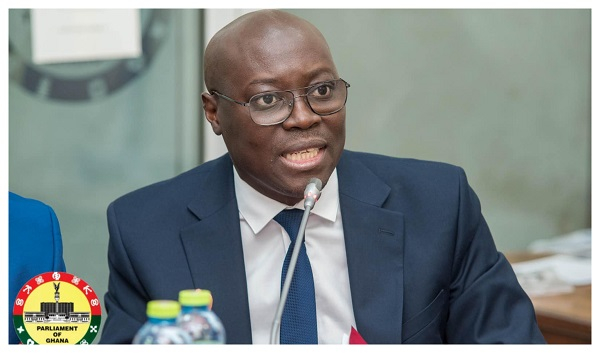 Minister of Finance, Dr. Cassiel Ato Forson
Minister of Finance, Dr. Cassiel Ato Forson
Government officials have commenced discussions with the International Monetary Fund (IMF) on the 2025 budget, as the country seeks to consolidate gains made under the IMF-supported programme while addressing fiscal and economic challenges.
The discussions, taking place from February 10 to 14, 2025, are expected to focus on key policy measures including revenue administration reforms, energy sector restructuring and expenditure rationalisation.
The IMF mission, led by Stephane Roudet, is assessing progress under its ongoing economic stabilisation programme, which was initiated in response to persistent fiscal imbalances and external vulnerabilities.
Ghana’s fiscal deficit, which stood at 7.3 percent of Gross Domestic Product (GDP) in 2024, remains a central concern – particularly as government aims to bring it within the IMF programme target of below 5 percent in 2025.
Inflation peaked at 54.1 percent in early 2023 but has since moderated to 23.5 percent as of January 2025, in part due to tighter monetary policies and exchange rate stabilisation efforts by the Bank of Ghana (BoG).
Fiscal consolidation, revenue mobilisation
Revenue mobilisation remains a crucial aspect of the discussions as government looks to increase domestic revenue generation without stifling economic activity.
Tax-to-GDP ratio, currently at 13.1 percent – below the African average of 16.5 percent – has been flagged as an area requiring urgent reform.
“The discussions will centre primarily on Ghana’s progress under the IMF-supported programme and policy direction of government in the 2025 budget,” the Ministry of Finance said in a statement.
Pledges to eliminate various revenue measures – such as the E-Levy, Covid tax, emissions tax and betting tax – will require stronger revenue mobilisation efforts and tighter expenditure controls to compensate for the shortfall.
Projections indicate that removing these taxes will lead to a revenue loss of GH¢6.37billion in 2025, rising to GH¢7.37billion in 2026 and GH¢8.41billion in 2027.
Meanwhile, the IMF programme constraints remain in place – with the overall deficit expected to narrow further to -2.7 percent from the projected -3.5 percent in 2024, alongside a targetted increase in the primary surplus to 1.5 percent.
The Ghana Revenue Authority (GRA) is expected to outline measures aimed at expanding the tax base and improving compliance, including enhanced digital taxation initiatives and improved collection mechanisms.
Energy sector reforms
A critical component of IMF discussions is the energy sector, which has been a persistent drain on public finances. Energy sector debt, which stood at approximately US$2.1billion as of 2024, has been a major contributor to the country’s fiscal challenges; with unpaid subsidies and inefficiencies continuing to weigh on government’s balance sheet.
The IMF has previously emphasised a need for structural reforms in the energy sector, including cost-reflective tariffs and renegotiation of power purchase agreements.
With rising global energy prices and a weakening cedi – currently trading at GH¢15.2 to the US dollar on the interbank rate – government faces difficult choices in balancing affordability with sustainability.
Expenditure rationalisation and monetary policy
Expenditure rationalisation will also be a key focus as government works to maintain essential public services while keeping spending within IMF-prescribed limits.
The 2024 budget deficit of GH¢62.6billion highlighted the challenge of managing expenditures against a backdrop of slow economic recovery.
The central bank, which has kept its benchmark policy rate at just under 30 percent since mid-2024, will play a critical role in discussions on monetary policy and exchange rate stability.
While inflation has shown signs of easing, the central bank remains cautious about premature easing of monetary policy – given external pressures and global economic uncertainties.
“The Bank of Ghana, Ghana Revenue Authority, Controller and Accountant-General’s Department and other key institutions are expected to be present in the scheduled meetings,” the Finance Ministry stated.
Stability, growth
Government has sought to reassure the public that economic reforms will not come at the expense of job creation and social welfare.
“The government of Ghana assures the public of its commitment to prioritising macroeconomic stability, job creation and improved livelihoods for the people of Ghana,” the Ministry of Finance noted.
Analysts have said they expect the 2025 budget to reflect a balance between fiscal consolidation and targetted investments to support growth in key sectors including agriculture, manufacturing and digital services.
They argue that this will be crucial – with public debt at approximately 74.5 percent of GDP – in determining the next steps for debt sustainability and economic recovery, investor sentiment and influencing credit ratings.
Watch the latest edition of BizTech below:
Click here to follow the GhanaWeb Business WhatsApp channel
